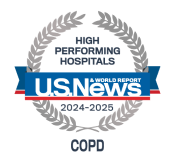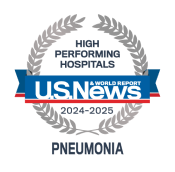COPD and Pneumonia

When you have COPD, you are more likely to get an infection in your lungs known as pneumonia.
Pneumonia is caused by viral infections like the common cold, the flu or even COVID-19, but can also be caused by bacteria, fungi or other microorganisms. It causes inflammation in the tiny air sacs in your lungs. Your lungs may also fill up with fluid or pus making it harder to breathe. Pneumonia is especially dangerous for COPD patients because it raises your chance of respiratory failure – a serious condition that can mean your body is not getting the oxygen it needs.
Because the symptoms of pneumonia are similar to COPD flare-ups, it is easy to confuse the two. Here's what to watch for:
- Severe shortness of breath or more rapid breathing
- Pain in one area of the chest with deep breaths
- Cough with more mucus than usual or a change in mucus color
- Fever over 100.5 degrees or shaking chills
- More rapid heart rate
- Nausea, vomiting or diarrhea
Pneumonia can also lead to other problems like kidney damage, stroke and heart attack. That's why you should call you doctor as soon as you notice any of the above symptoms.
COVID-19 and Pneumonia
While not at a higher risk for getting COVID-19, having COPD does leave you at higher risk for developing severe complications, like pneumonia, if you do get it. If you have COVID-19 and get pneumonia, the irritation is more wide-spread and affects multiple locations, so the pain in your chest may be in more than one location. Common early signs of COVID-19 are fever, a dry cough, and shortness of breath, but other symptoms may arise.
If you have COVID-19, look out for these symptoms that may indicate you are developing pneumonia:
- Shortness of breath or breathlessness
- Rapid breathing
- Rapid heartbeat
- Dizziness
- Heavy sweating
If you experience these symptoms, call your doctor right away or go to the nearest emergency room.
It is very important for people with COPD to take precautions to prevent contracting COVID-19 by following the safety guidelines listed below.
How to reduce your risk of getting pneumonia and COVID-19
It is possible to reduce your chances of getting pneumonia, even if you have COPD. Along with regular hand washing, the U.S. Centers for Disease Control and Prevention (CDC) recommend you get the following vaccines:
- Influenza (flu)
- Pneumococcal (pneumonia, meningitis)
- Tdap (tetanus, diphtheria, whooping cough/pertussis)
Both influenza vaccination and pneumococcal vaccination have been shown to prevent pneumonia. Additionally, Tdap can prevent pertussis, which is an infection associated with pneumonia.
To stay healthy, you should:
- Wash your hands frequently with soap and water for at least 20 seconds, or use hand sanitizer if soap and water are not available.
- Stay away from crowds and practice social distancing, especially during cold and flu season.
- Avoid contact with people who are or might be sick.
- Wear a mask when around other people that you do not live with and ask that others to wear a mask around you.
- Avoid touching your mouth, eyes and nose in public; this includes adjusting your mask.
- Use your own pen, especially when signing in at your doctor's office.
- Get plenty of sleep.
- Stop smoking.
- See your doctor at your regular appointments, even if you feel fine.
- Continue taking your medicines as prescribed.


